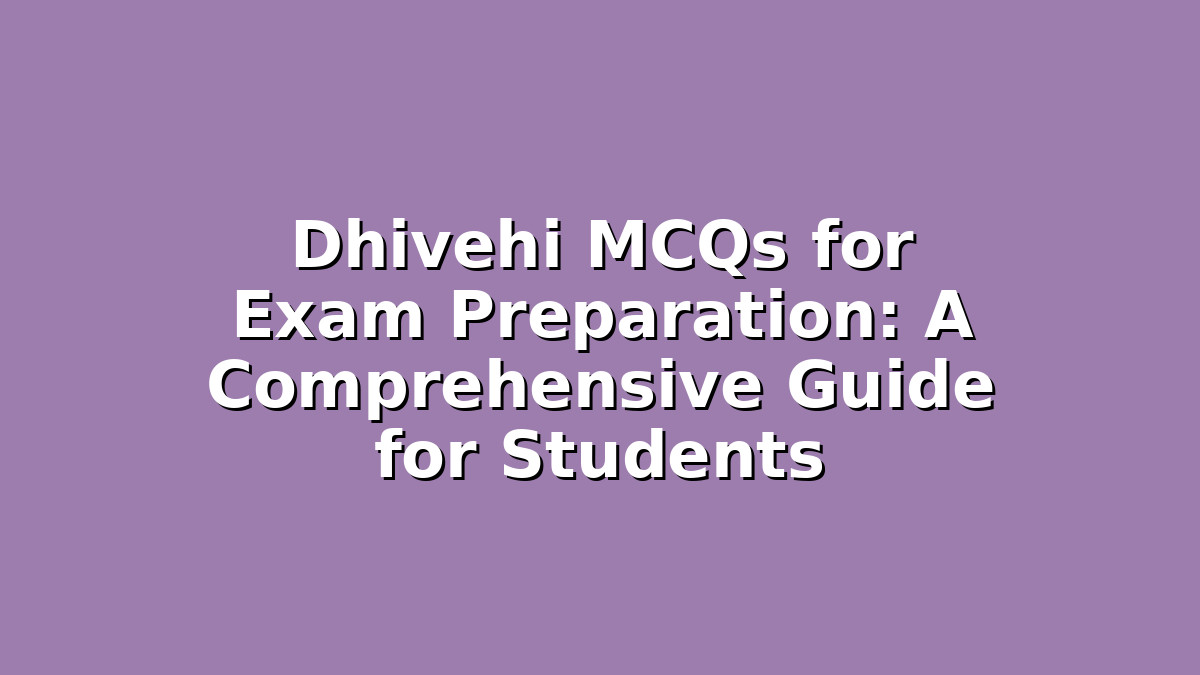Preparing for exams can be a challenging and stressful time for students, especially when it comes to mastering subjects with unique languages like Dhivehi. Dhivehi, the official language of the Maldives, requires focused study techniques to excel, particularly when exams include multiple-choice questions (MCQs). This article will guide you through effective strategies to tackle Dhivehi MCQs, improve your understanding, and boost your confidence for exam day.
Understanding the Importance of Dhivehi MCQs
Multiple-choice questions are a popular exam format because they test a broad range of knowledge efficiently. Dhivehi MCQs often cover grammar, vocabulary, comprehension, and cultural context, requiring both memorization and critical thinking. Unlike essay questions, MCQs demand quick decision-making and a strong grasp of language nuances. Preparing well for these questions can help you secure high marks and demonstrate a solid command of Dhivehi.
Section 1: Mastering Dhivehi Grammar and Vocabulary Through MCQs
One of the main focuses of Dhivehi MCQs is grammar and vocabulary. To prepare effectively, students should:
– Create Flashcards: Use flashcards to memorize Dhivehi words, phrases, and grammar rules. Writing down the word on one side and the meaning or rule on the other can reinforce memory through active recall.
– Practice Regularly: Consistent practice with grammar exercises and vocabulary lists helps internalize rules such as verb conjugations, sentence structure, and common idioms.
– Use Online Resources: Many websites and apps offer Dhivehi learning tools. Utilize these to get accustomed to different question formats and vocabulary usage.
– Identify Common Pitfalls: Pay attention to typical mistakes, like confusion between similar-sounding words or grammatical exceptions. Knowing these common errors can help you avoid traps in MCQs.
By focusing on grammar and vocabulary, you build a strong foundation that makes answering MCQs easier and more accurate.
Section 2: Sharpening Comprehension Skills for Dhivehi MCQs
Comprehension questions test your ability to understand and interpret written Dhivehi passages. To excel at these:
– Read Dhivehi Texts Daily: Immerse yourself in Dhivehi newspapers, stories, or poems. This exposure improves your reading speed and comprehension.
– Summarize Passages: After reading a passage, try to summarize it in your own words. This strengthens your understanding and helps you identify key points quickly.
– Practice MCQs on Passages: Work on sample MCQs that accompany Dhivehi texts. This trains you to pick out important details, infer meanings, and eliminate wrong answer choices.
– Highlight Keywords: When tackling comprehension MCQs, underline or highlight keywords in the questions and text. This visual aid helps focus your attention on relevant information.
Improving your comprehension will make you more confident in answering questions that require you to analyze and understand Dhivehi content.
Section 3: Effective Study Habits and Exam Strategies for Dhivehi MCQs
Preparing for Dhivehi MCQs isn’t just about knowing the content—it’s also about how you study and approach the exam:
– Create a Study Schedule: Allocate specific times for Dhivehi study daily. Breaking your preparation into manageable chunks prevents last-minute cramming and reduces anxiety.
– Use Past Exam Papers: Reviewing previous years’ Dhivehi MCQs familiarizes you with exam patterns and question types. It also helps you time yourself and manage exam pace.
– Practice Elimination Techniques: When unsure about an answer, eliminate obviously incorrect choices first. This improves your chances if you need to guess.
– Stay Calm and Positive: Exam anxiety can cloud judgment. Practice relaxation techniques such as deep breathing before and during the exam to stay focused.
– Group Study: Sometimes discussing questions with peers can provide new insights and reinforce your understanding. Just be sure to keep the group focused and productive.
By adopting these study habits and strategies, you enhance your ability to tackle Dhivehi MCQs confidently and efficiently.
Conclusion
Dhivehi MCQs can initially seem daunting, but with the right approach, they become manageable and even enjoyable. Focus on building a strong vocabulary and grammar base, sharpen your comprehension skills through regular reading and practice, and adopt effective study habits to prepare thoroughly. Remember, consistency and a positive mindset are key to exam success. Keep practicing, stay motivated, and trust in your abilities—you are capable of acing your Dhivehi exams.
Good luck with your studies!

Responses